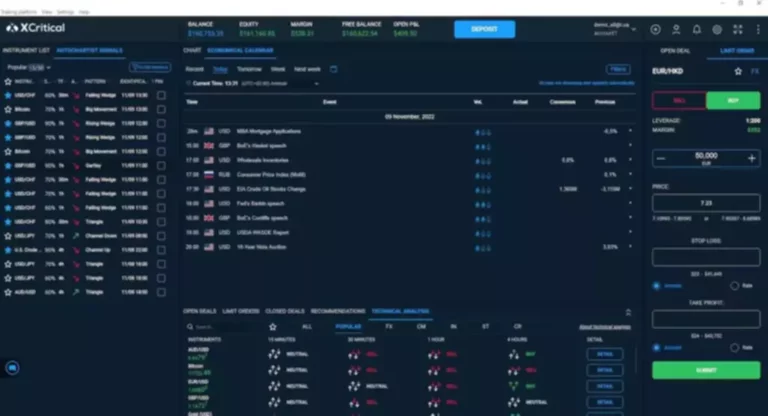Content
Understanding the differences between an Introducing Broker (IB), Clearing Broker, and Executing Broker is essential for traders and investors looking to navigate https://www.xcritical.com/ the brokerage landscape effectively. In conclusion, understanding the role of an Introducing Broker is crucial for anyone venturing into the world of finance. By connecting investors with the right market participants, IBs facilitate trades, provide valuable insights, and ensure compliance with regulations. Whether you’re an individual investor or a financial institution, working with a reputable and registered IB can help you navigate the complexities of the financial landscape more effectively.
How Is a Clearing Fee Calculated?
Carrying brokers will often provide clients with dedicated account managers who can resolve all issues as they arise. introducing broker vs clearing broker The introducing broker is best understood as the equivalent of a stockbroker in the futures market. A stockbroker maintains a relationship with clients and may recommend investment strategies or specific investments to their clients over time. General clearing firms provide clearing services for a wide range of financial instruments, including stocks, bonds, options, and futures.
Broker-Dealer Compliance Standards
Despite requiring Proof of personhood significant infrastructure and resources, self-clearing firms enjoy greater control and flexibility over the clearing process. An Introducing Broker is an individual, group, or company that connects potential investors with financial markets. Acting as a middleman, IBs bridge the gap between investors and brokerage firms or exchanges, facilitating transactions and providing valuable insights into the market. The role of a clearing firm is to ensure the smooth settlement of trades by verifying the identity and creditworthiness of both parties, managing the transfer of securities and funds, and providing risk management services. The executing broker within the prime brokerage will locate the securities for a purchase transaction or locate a buyer for a sale transaction.
AML Requirements for Registered Investment Advisors
- Clearing firms facilitate the settlement and delivery of trades by ensuring that the necessary funds and securities are transferred between parties.
- These brokers usually partner with risk management companies to provide hedge funds with daily risk and performance reports.
- In some cases, these fees were fixed and simply non-negotiable, whereas other clearing firms were willing to completely scrap or restructure their proposal based on our preferences.
- Affiliates are answerable for creating affiliate websites or hyperlinks to be able to refer new clients.
These agreements are crucial for defining each party’s roles and responsibilities, facilitating a clear understanding of operational procedures and expectations. With the amazing help and support from the Solomon Team I passed the SIE on my first attempt. Professional traders open positions based on signals brought by different tech indicators. Engaging in planning and analysis is beneficial, for investment banks (IBs) as it allows them to anticipate and address potential financial challenges proactively. To protect their reputation IBs must emphasize transparency and ethical behavior, in all client dealings.

Regulatory Compliance for Introducing Brokers
Additionally, the clearing broker often provides additional services beyond just clearing. Next, we’ll dive deeper into the specific clearing nuances in the US stock market. Managing client accounts and maintaining confidentiality are additionally important obligations of an introducing broker. Introducing brokers act as custodians of their client’s funds and must ensure that all account activities are performed with the highest degree of integrity.

Then, we will take a look at their other add-on services, also known as concierge services. Beyond trade settlement, clearing firms also hold custody of account holders’ securities and other assets, such as cash. They play a crucial role in reducing the risk of failed trades by confirming that all parties have the necessary funds and can meet their commitments.
In the example, when you place the order to buy 100 shares, that order goes to the executing broker. They review the order for validity, either personally or electronically, and then send the order to the exchange. Usually run by large investment banks, full-service prime brokers combine the services offered by both traditional prime brokers and synthetic prime brokers, providing customers with a large spectrum of resources.
The decision between acting as a self-clearing or introducing broker depends on a firm’s resources, strategic goals, and client service focus. Self-clearing offers greater control but requires substantial resources while introducing brokers benefit from the specialization and efficiency of clearing firms. Delivery/Receipt Versus Payment (DVP/RVP) — this is the basic arrangement described above where trades are settled on a T+2 basis.
These prime brokers typically work with structures and synthetic financial instruments, which are created to imitate specific financial instruments while making changes in key characteristics. These brokers facilitate the borrowing of funds using more mainstream, traditional financial instruments such as stocks. Traditional prime brokers usually have a much smaller operation size because they don’t work with derivatives or financial structures. By addressing these legal considerations, introducing broker agreements can effectively manage compliance, protect interests, and minimize the likelihood of disputes.
Clients seeking ongoing advisory support and a relationship built on trust gravitate toward RIAs, while those needing transactional services find broker-dealers to be a better fit. They prioritize a holistic approach, focusing on their clients’ overall financial well-being rather than individual transactions. This often involves continuous monitoring and adjustment of financial strategies to align with evolving client goals, making RIAs trusted partners in wealth management. For instance, a broker-dealer may suggest an investment product that meets the client’s risk tolerance and goals but offers a higher commission for the broker.
In essence, clearing firms are responsible for handling trades sufficiently, while broker-dealers partake in trading themselves. Additionally, a clearing broker should always be a firm or official business, whereas broker-dealers can consist of a singular person. Their difference from other broker types, such as executing and introducing brokers and custodians, makes understanding them even more critical, which is why you’ve clicked on this article. So, we suggest you stay tuned and learn more about prime brokers vs. clearing brokers.
IBs do not execute trades themselves; they refer the client to someone on the trading floor. The National Futures Association (NFA) regulates derivatives in the United States. Introducing Broker is a term given to companies or individuals operating majorly in the futures market.
Broker-dealers face additional requirements, such as FINRA membership, net capital minimums, and the creation of robust supervisory systems, making it a more resource-intensive process. Their commission-based earnings model also creates inherent conflicts, as brokers may be incentivized to recommend products with higher payouts. Their fee-only compensation model further minimizes conflicts by eliminating commission-based incentives tied to specific products. One of the most noticeable differences between RIAs vs. broker-dealers is how they earn their income.
First, there is regulatory risk, as introducing brokers must comply with complex and evolving financial regulations, which can lead to penalties if not properly managed. Second, there is reputational risk; any issues with the partnered brokerage firm, such as poor service or financial instability, can negatively impact the introducing broker’s reputation. Third, financial risk is present, as income is often tied to client trading activity, which can be unpredictable. Lastly, market risk affects the overall financial environment, potentially impacting the demand for brokerage services.
